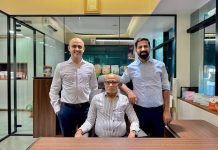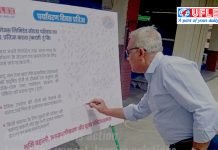
Dharaksha was created with the aim to curb stubble burning and plastic pollution by creating sustainable and biodegradable alternatives to conventional packaging items and perishables. The company, which specializes in biodegradable packaging material, uses mycelium (fungi) as a medium to transform stubble waste into effective breakage-free packaging for electronics and perishables.
Dharaksha is a combination of two Hindi words, ‘Dhara’, which means earth, and ‘Raksha’, which means saving — translating to ‘saving the earth’.
According to CEO Arpit Dhupar, their process does not create any kind of pollution, fumes, and black liquor, which is a toxic residue during the production process. Even the rejected products can be reused as raw materials, he said. The eco-solution company also aims to replace thermocol packaging with customized alternatives. It has developed a nutrient medium called Somras, which fastens the growth of fungus.
Dhupar is a mechanical engineer by education and an entrepreneur by profession. “Since school days, I have believed that I belong to the luckiest among the lucky to have been born into a family that can afford quality education and quality lifestyle. I always felt that it is my responsibility to give back to society, not in the form of philanthropy but in the form of active efforts to solve society’s problems by utilizing the technical skills and knowledge that I acquired in my education. I wanted to reduce our dependence on fire as a society.”
Stubble (parali) burning is a method of removing paddy crop residues from the field. This process involves setting on fire the straw stubble left after the harvesting of paddy and wheat, which leads to pollution havoc, mainly across the north Indian plains. It is usually done in areas that use the combined harvesting method that leaves a crop residue behind.

In 2020, Dhupar started working on Dharaksha Ecosolutions, where he, along with his team, built a biotechnology solution to convert crop stubble waste into biodegradable packaging material. This had a dual aim — tackling the problem of air pollution as well as unsustainable plastic and thermocol waste.
“The overexploitation of fire as a resource for all our energy requirements has been a cause of disruption in the natural order, polluting air, water, and land. We visited a lot of farms in Punjab and Haryana and discovered that stubble burning is a major issue, especially due to the lack of alternative solutions. The burning of stubble reduces the fertility of the land. The entire process takes up more than two days for burning, cooling, and clearing the fields.”
In the US and other Western countries, the farmers get rid of the crop remains with baler machines, which compress trash and waste materials for more efficient disposal. Inside each baler is a press that can generate enough force to compact cardboard boxes and other industrial or commercial trash into bales.
Dhupar adds, ”We collaborated with John Deere for baler machines to be supplied to India. It cleaned the fields faster than fire. Our idea was simply to collect all the stubble. The response it gained was immense. More and more farmers wanted to pitch in to get their fields cleared. We kept up with our R&D because we were facing hindrances in the application of this stubble. Eventually, the knots untied and we came up with the idea of implementing bio-fabrication to manufacture something that can’t be made conventionally.”
Dhupar and the team explored market opportunities that could get traction for their bio-fabricated product and found out that thermocol-based packaging is in a phase of transition due to a lack of means of disposal. “Till we got to the market analysis, our work culture of fabrication had gotten stronger wherein we no longer manufactured but grew our molds and so it became a completely organic process. We had achieved what we desired. Our production does not leave any scope of wastage and if any product looks not up to the mark, we can easily reuse that as raw materials, making it a win-win situation.”
Although the desired product was achieved, Dhupar believes that Dharaksha has much more potential and that they have barely scratched the surface. “We have engineered a proper purchasing price. Since it’s completely biodegradable, even the customers are interested in buying our products. Our next step is obviously the scalability and consumer awareness about what we do and what we have achieved so far. But we are still on with the R&D, hoping to bear better fruits for society. My motivation for all of my endeavors stems from an old school friend who once said ‘the fool didn’t know it was impossible, so he did it anyway’.”









